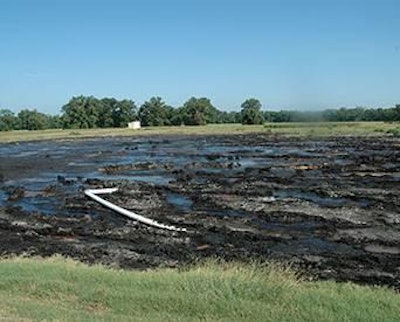
Wayne Farms' Danville, Arkansas, fresh poultry plant uses a simple test to keep its poultry wastewater treatment operating in balance: the Ripley ratio. This helped the poultry plant earn honorable mention in the 2014 U.S Poultry and Egg Clean Water Award full-treatment category.
Through the annual Clean Water Award, outstanding wastewater treatment facilities operated by poultry companies and allied industries are recognized. The full treatment category covers facilities that discharge processed effluents directly into navigable waters or final land application systems.
Wet chemistry monitoring, adopted at the fresh chicken processing plant after a major upset in the poultry wastewater system in 2011, keeps the full-treatment system in balance and operating efficiently.
Poultry wastewater process in Danville
At the Danville facility, fresh poultry processing, hatchery and feed mill operations generate the average daily volume of 0.9 million gallons requiring treatment before discharge.
The wastewater system begins screening, and then anaerobic lagoons are used to equalize flow; pretreat a portion of the easily biodegradable organic carbon (five-day carbonaceous biochemical demand or CBOD5); and convert organic nitrogen to ammonia for further treatment. Advanced aerobic and anoxic processes are then operated to achieve low double-digit concentrations for the remaining total wastewater BOD5 components – organic carbonaceous and nitrogenous or nitrogen pollutants. After settling in a lagoon clarifier, the effluent undergoes ultraviolet light disinfection and cascade aeration prior to discharge to the Petite Jean River.
Major upset in poultry wastewater process
While the facility meets the award criteria of no significant non-compliances, notices of violations or any other type of enforcement action for at least two years, an extended shutdown for a processing chiller upgrade in fall 2011 resulted in a near catastrophic upset throughout the entire wastewater treatment plant.
Anita VanRavensway, facility compliance manager, said, “We had major, major upset throughout the entire system that resulted in a total and extended loss of nitrification and solids separation. It went undetected until toxicity had developed.”
Ed Boggs, wastewater supervisor and certified Arkansas Department of Environmental Quality Class IV Municipal and Advanced Industrial Operator, added, “We looked at the tank systems because that’s where we started to see the problem. After talking with a significant number of water treatment technicians, engineers and biochemists, we determined that the anaerobic lagoon, due to a lack of influent flow and reduced organic loading, had an upset in the balance between the acid-forming anaerobic bacteria and methane generators, resulting in toxicity within the down-stream aerobic and anoxic reactors.”
Wet chemistry monitoring of poultry wastewater
Wayne Farms' Danville environmental team, through an extensive consultation process, identified the Intermediate Alkalinity/Partial Alkalinity (IA/PA test) which is also referred to as the Ripley ratio. Using this wet chemistry monitoring check, operators now monitor the daily status of the wastewater system’s performance.
“The shortage of a consistent microbial food source allowed the acid-producing bacteria to dominate in the anaerobic lagoon, thus consuming all available alkalinity. This test is now our foundational process control for all of our wastewater operations,” Boggs said.
Since the daily process control test was added, no significant biological upset has occurred and the operators have a better understanding of the anaerobic lagoon's normal patterns.
Community involvement for Wayne Farms
VanRavensway noted, “Now we can rest more easily and focus on the fun parts of being a Wayne Farms Danville employee. We are greatly involved in our community and local festivals, with a particular focus on a Kick-Off for Kids program where we give class room supplies to every kindergarten-aged child in Yell County."
Now that clean water and methane are an everyday occurrence, the team is focused helping the facility reduce and reuse water as well as methane gas capture. At Wayne Farms, Danville, better use of the resources gained from solving problems that caused many sleepless nights should sustain a future of clean water and energy as well as restful sleep.

















